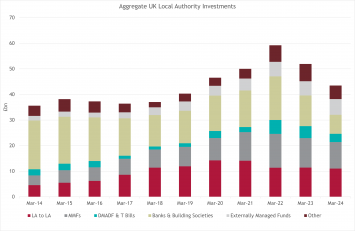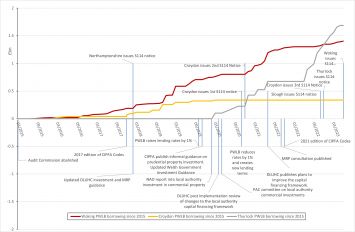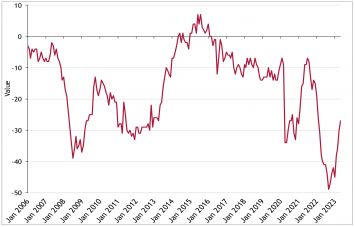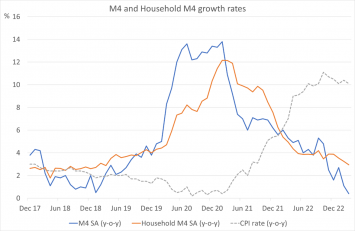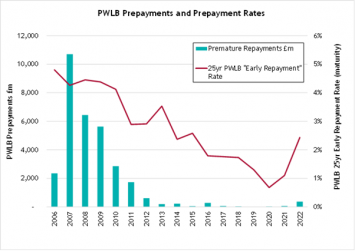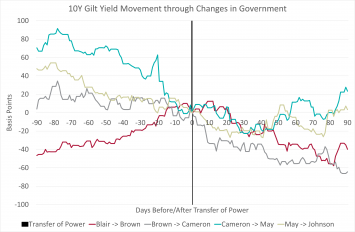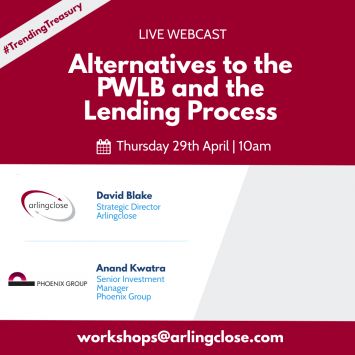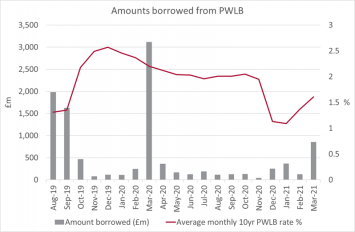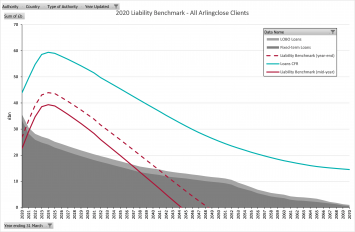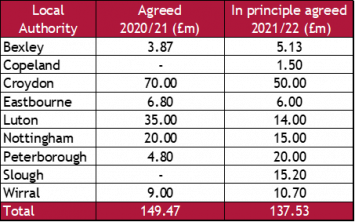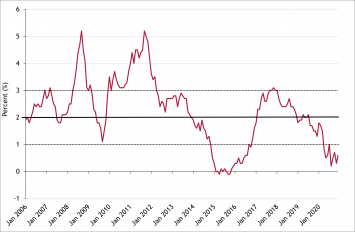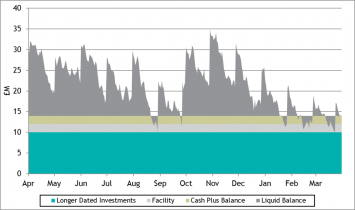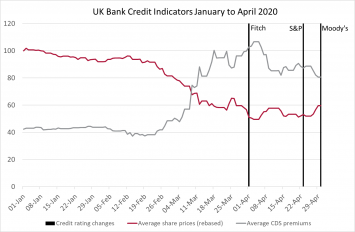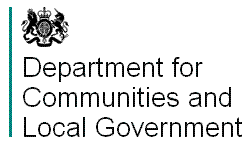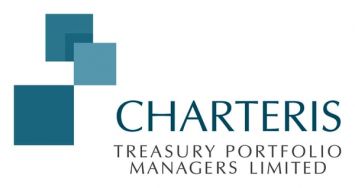Are Institutions Rethinking Their ESG Commitments?
Friday 13 February 2026Some financial institutions are stepping back from formal ESG and net-zero commitments in response to political, regulatory, and commercial pressures, raising questions about how ESG priorities are interpreted and applied.
Read moreWhat does the new SEND funding settlement mean for council borrowing?
Wednesday 11 February 2026Central government’s decision to fund 90% of councils’ cumulative SEND deficits provides major relief to local authorities, which have faced rising demand, growing borrowing needs, and accounting pressures due to statutory SEND duties and insufficient funding. The grant will significantly reduce borrowing projections for many councils, though concerns remain about how future SEND costs will be sustainably funded.
Read moreIs Impact Investing the Right Strategy for Charities?
Wednesday 11 February 2026While impact investing offers charities a way to better align capital with the core mission, investing in these markets requires clear definitions of risk tolerance, setting realistic expectations, and careful management of additional risks involved.
Read moreWill the MPC cut Bank Rate in March 2026?
Wednesday 11 February 2026The MPC left Bank Rate at 3.75% on the 5th of February, but a surprise 5–4 vote prompted markets to sharply increase expectations of a March cut. Four members backed an immediate reduction, signalling a clear shift towards easing, while updated forecasts show weaker growth and inflation returning to target sooner than expected.
Read moreTime to Revisit Housing Company Structures?
Tuesday 10 February 2026Recent changes to PWLB policy and the HRA threshold send a clear signal that government now expects councils to deliver social housing directly, on balance sheet, and at lower cost. With discounted HRA borrowing extended to 2027 and regulatory barriers materially reduced, many authorities should urgently reassess whether housing company structures still represent value for money in today’s policy and funding environment.
Read moreWhat is Causing the LA-to-LA Liquidity Squeeze?
Monday 09 February 2026As year-end approaches, an LA-LA squeeze is pushing inter-authority borrowing rates higher, narrowing the cost advantage over PWLB and reinforcing the importance of flexible liquidity planning and diversified funding options.
Read morePolice and Fire Authorities: Are They Different from Other Local Authorities?
Friday 06 February 2026Police and fire authorities are not simply smaller local authorities. Their narrow functions, constrained funding, and evolving governance models create distinct financial and treasury priorities, increasingly shaped by devolution and reform.
Read moreAre ESG Issues Impacting UK Commercial Property?
Thursday 05 February 2026UK commercial property continues to offer long-term income, but sustainability is becoming a growing source of differentiation. Energy efficiency and environmental risk are starting to influence resilience, particularly in offices, with impacts varying across other sectors. Over time, these factors may shape asset quality and capital requirements more than near-term pricing.
Read moreIs the latest government housing package a game changer?
Thursday 05 February 2026Government ministers have unveiled a long-term housing package offering rent certainty, £39 billion of funding and ultra-cheap loans, alongside regulatory breathing space. Promising on paper, but major delivery pressures around safety, retrofit and new supply could still undermine the decade of renewal.
Read moreWhat Do Shifts in the International Order Mean for Global Finance?
Wednesday 04 February 2026US political volatility and growing use of economic coercion may accelerate a shift towards a more fragmented, multipolar financial system. Trade and investment ties could weaken over time, de-dollarisation may gradually advance, and markets may face higher risk premiums, volatility, and rising sovereign borrowing costs.
Read moreShould You Worry About the First US Bank Failure of 2026?
Tuesday 03 February 2026The first US bank failure of 2026 may have passed with little attention, but it is a timely warning that financial strains are still surfacing beneath the surface, reinforcing the need for proactive credit due diligence in treasury management.
Read moreAre Treasury Teams Ready for Local Government Reorganisation?
Tuesday 03 February 2026Local government reorganisation creates immediate treasury risks that go well beyond strategy, from liquidity access and banking mandates to system readiness and retained expertise. This insight shares practical lessons from officers already through LGR, highlighting what treasury teams must prioritise to ensure a stable and compliant Day One.
Read moreHow to Value Shares in a Private Company?
Wednesday 21 January 2026Private company share valuations can be difficult, but they matter. With no market price to rely on, you need a fair value that is credible, evidenced, and defensible, not guesswork. This short guide explains the key valuation methods, when to use them, and how to produce an audit-ready result.
Read moreWhat are the Investment Options and Strategies Available to Charities?
Thursday 15 January 2026Charities face a balancing act between yield, liquidity and security when investing cash reserves. This article outlines practical options across the curve, from bank deposits and money market funds to Treasury Bills and high-quality bonds, and explains how diversification and maturity ladders can strengthen outcomes.
Read moreWhat Are the Treasury Risks Facing Housing Associations?
Monday 12 January 2026Treasury risk in housing associations is often viewed as settled, but some exposures receive more attention than others. Interest rates, liquidity timing, covenant headroom, security capacity and refinancing pressures interact over time, shaping resilience and highlighting why long-term financial planning assumptions matter.
Read moreHow divided is the Monetary Policy Committee?
Wednesday 07 January 2026A finely split MPC, newly transparent voting rationales and a policy rate edging towards neutral mean the next phase of UK interest rate decisions will be driven less by the headline vote and more by where individual members truly sit on inflation and demand risks.
Read moreAre Universities Managing the Wrong Treasury Risks?
Monday 05 January 2026As UK universities enter 2026, the balance of treasury risk has shifted. Interest rate risk remains important, but greater pressures now sit in liquidity timing, income volatility, counterparty concentration and funding resilience, pointing to the need for a reset of treasury risk frameworks.
Read moreDo Section 114 Notices Indicate Credit Risk?
Tuesday 23 December 2025A section 114 notice signals acute financial pressure but also demonstrates the strength of the local government financial framework. Statutory controls, governance and central support materially limit lender risk, shifting the focus from credit risk to evidencing robust, auditable due diligence.
Read moreWhy Use iDealTrade? 10 Key Benefits of the Platform
Monday 22 December 2025iDealTrade is a secure, low-cost platform that automates local authority to local authority lending, replacing voice brokers with efficient trade matching and embedded market intelligence to support cost-effective local-to-local financing.
Read moreAre UK (Private) Financial Markets Safe?
Wednesday 17 December 2025The Bank of England has launched its second System-Wide Exploratory Scenario, examining risks in private equity and private credit markets. Rapid growth, limited transparency and strong links to the UK economy raise questions over systemic risk, regulation and future financing conditions.
Read moreHow to measure local authority creditworthiness?
Tuesday 16 December 2025UK local authorities remain highly creditworthy. Arlingclose’s Financial Strength Scores offer a transparent, data-driven framework to distinguish relative strength across the sector, supporting proportionate, well-evidenced treasury decisions aligned with the CIPFA Treasury Management Code requirements.
Read moreWhat are the Changes in the Further & Higher Education Statement of Recommended Practice (FEHE SORP)?
Monday 15 December 2025This insight summarises the 2026 FEHE SORP, highlighting major changes to strategic reporting, income recognition, lease accounting and development expenditure.
Read moreWhat is the future of QE and QT in the US and UK?
Friday 12 December 2025This insight explains quantitative easing and quantitative tightening, outlining how they operate and why they matter for interest rates, liquidity and financial conditions. It compares US and UK experiences since 2008 and considers the implications of ongoing balance sheet reduction for money markets and government bond yields.
Read moreWhy was the UK sovereign rating affirmed?
Thursday 11 December 2025Moody’s affirmed the UK’s sovereign long-term rating with a stable outlook, citing strong institutions and balanced fiscal risks, while medium-term prospects improve through planned policies, investment reforms and potential gains from innovation and EU relations.
Read moreWhat does the Budget mean for Charities?
Wednesday 10 December 2025What does the Autumn Budget mean for charities as limited government and individual support, frozen tax thresholds, rising costs, and income pressures combine to create a tougher financial environment that requires stronger planning and disciplined investment?
Read moreHow Will the Budget Affect Housing Associations?
Thursday 04 December 2025The 2025 Budget introduces new funding channels, planning reforms, welfare changes and long-term rent policy that will influence housing association finances, raising questions about scale of opportunities that may now be opening.
Read moreWhat Treasury Strategies Do I Need to Prepare?
Tuesday 02 December 2025Local authorities are preparing Capital, Treasury and Non Treasury Investment Strategies plus MRP or Loans Fund policies. Each outlines borrowing, investment parameters, risk, limits and long term plans, providing a clear narrative of the authority’s financial position and future direction.
Read moreWhat will Markets be watching in the Budget?
Friday 21 November 2025An overview of key Autumn Statement scenarios and how the government's forthcoming fiscal choices will impact on gilt yields, fiscal credibility and market confidence.
Read moreA Recalibration of English Higher Education
Thursday 20 November 2025The Post-16 Education and Skills White Paper reshapes English higher education, linking funding & governance to quality & specialisation.
Read moreWhat does the new FSCS Limit mean?
Wednesday 19 November 2025The planned increase in FSCS deposit protection to £120,000 from December 2025 reflects regulatory efforts to maintain confidence in the financial system. The change restores the real value of cover, updates limits for temporary high balances, and prompts consumers and treasury professionals to reassess how deposits are distributed across authorised firms.
Read moreWhat are the changes to the Charities Statement of Recommended Practice (SORP)?
Friday 14 November 2025The Charity Commission’s updated SORP introduces a new three-tier reporting structure, revised lease accounting aligned with FRS 102, and enhanced ESG disclosures. Effective from 1st January 2026, charities must assess forecast income, review leases, and prepare systems and policies to ensure compliance and transparency under the updated framework.
Read moreParish Council Borrowing
Thursday 13 November 2025Parish and town councils must secure borrowing approval before applying for funding, typically from the PWLB. With rates now around 4–6%, assessing affordability, project viability and alternative funding options is more important than ever.
Read moreHow Does Adjustment-A Impact Local Government Reorganisation?
Friday 07 November 2025Local government reorganisation requires resolving historic technical finance adjustments such as Adjustment-A, ensuring fair treatment of inherited debt and CFR balances, to avoid uneven revenue impacts and enable new authorities to begin with prudent, equitable debt repayment positions.
Read moreWill Bank Rate Be Cut in November?
Tuesday 04 November 2025Arlingclose expects a UK Bank Rate cut in Q4 2025, with easing inflation, a softer labour market and fiscal tightening strengthening the case. A November move is unlikely, but momentum for December is growing, signalling lower rates ahead for 2026.
Read moreFunding Strategy Options for Local Authorities
Wednesday 29 October 2025With borrowing costs elevated and liquidity under pressure, local authorities must adopt a strategic, forward-looking approach. Current conditions highlight the importance of active treasury management, cash flow planning, diversified funding, and scenario analysis to strengthen financial resilience.
Read moreDoes the UK (and its Treasury) Have a Productivity Problem?
Friday 24 October 2025The UK faces a persistent productivity slowdown driven by weak investment, poor multi-factor productivity, and Brexit-related frictions. This stagnation now constrains growth, narrows fiscal headroom, and shapes the Treasury’s decision-making, with direct consequences for markets, politics, and your institution’s budget.
Read moreIs There an AI Stock Market Bubble?
Thursday 23 October 2025The rise of Artificial Intelligence has fuelled warnings of a new technology-driven market bubble. However strong corporate balance sheets, equity financing and moderate valuations suggest this is more a ripple than a repeat of history’s bubbles.
Read moreHow Resilient Are Universities to Tightening Liquidity?
Thursday 16 October 2025Universities face mounting financial pressure as rising borrowing costs, falling overseas income, and eroded domestic fees strain budgets. Liquidity and surpluses are declining, forcing institutions to tighten spending, delay projects, and rely on short-term credit to maintain financial stability.
Read moreIs Treasury Management the Hidden Message in the 2025 Charity Risk Assessment?
Wednesday 08 October 2025The Charity Commission's 2025 Risk Assessment warns that financial resilience is the sector's key challenges as costs rise and demand surges. In this climate, sound treasury management and governance are essential.
Read moreHow Do Credit Ratings and CDS Spreads Help Us Assess Creditworthiness?
Tuesday 07 October 2025Assessing creditworthiness is fundamental to sound treasury and investment management. Two primary tools used for this purpose are credit ratings and credit default swaps - each offering distinct but complementary insights into credit risk.
Read moreWhat to Expect in the Autumn Budget?
Friday 03 October 2025November’s Budget comes against a backdrop of weak growth, sticky inflation and stretched public finances, leaving the Chancellor with little room to manoeuvre. Markets will be looking for fiscal discipline and credible plans, while limited tax levers raise tough questions about whether manifesto pledges can hold.
Read moreWhat Does the US Government Shutdown Mean for the Economy?
Thursday 02 October 2025Congress’s failure to pass a full-year spending bill has triggered a US government shutdown. While debt servicing continues, a prolonged shutdown alongside slowing jobs growth, high deficits and shifting yield curves risks undermining confidence, growth and monetary policy timing.
Read moreThe Rise of LA-to-LA Lending
Wednesday 01 October 2025UK local authority investment has shifted markedly over the past decade, with LA-to-LA lending emerging as a core feature of treasury portfolios. Since 2014, volumes have more than doubled from under £5bn to over £12bn in 2025, now accounting for over 30% of the £41.3bn invested. This growth reflects the decline in bank and building society deposits and the appeal of LA-to-LA deals, offering flexibility, competitive rates, simplicity and strong security.
Read moreContractor Due Diligence
Wednesday 01 October 2025UK contractor ISG entered administration on 20th September, underscoring the ongoing risks in the construction sector and the vital importance of thorough due diligence.
Read moreWhat Happened in the Hammersmith and Fulham Interest Rate Swap Case?
Friday 26 September 2025The Hammersmith and Fulham swaps case redefined local authority risk-taking, banning derivatives for decades. With the general power of competence, councils can now prudently use swaps for risk management and savings.
Read moreThe Global Trade Slowdown and Its Impact on Growth
Monday 15 September 2025Global trade is no longer driving growth as it once did, while fiscal and monetary policy options are limited. Without a major boost from productivity or innovation, both the UK and US face a period of weak economic growth and the risk of stagnation.
Read moreTreasury Management for Charities
Wednesday 10 September 2025UK charities face volatile income, rising costs and growing demand. Effective treasury management is essential to protect assets and sustain missions. Arlingclose provides tailored advice on liquidity, investments and debt to strengthen resilience and ensure funds work harder for beneficiaries.
Read moreThe UK Municipal Bonds Agency: Did it Make a Difference?
Monday 01 September 2025The UK Municipal Bonds Agency set out to offer local authorities cheaper and more flexible borrowing, but struggled to compete with the PWLB’s simplicity and pricing.
Read morePreparing for Local Government Reorganisation
Thursday 21 August 2025Local Government Reorganisation creates major treasury challenges in debt, investments, reserves and operations. Without early planning, risks of disputes, delays and misstatements grow. This insight shares Arlingclose’s best practice for reorganisation, ensuring councils achieve resilient, compliant and sustainable treasury arrangements through a smooth financial transition.
Read moreGMCA Ruling Underscores Subsidy Control Risks in Council Lending
Wednesday 13 August 2025GMCA has won a landmark Subsidy Control Act case over two major development loans. Most authorities lack GMCA’s scale or track record, and without independent market evidence as set out in the Statutory Guidance, the same approach could leave your authority exposed.
Read moreIs Financial Repression Coming Back?
Monday 11 August 2025This article examines the potential resurgence of financial repression as a tool for managing high sovereign debt, analysing historical precedents, current policy trends, and risks, while outlining implications for interest rates, banking, fiscal sustainability, and macro-financial forecasting.
Read moreMedium Term Note Programmes: A Flexible Tool for Borrowing at Scale
Wednesday 06 August 2025A Flexible Tool for Borrowing at Scale
Read moreHow to Reduce Financial Risk in Major Projects?
Tuesday 29 July 2025Persistently high insolvencies underline elevated risks for councils and corporates involved in lending or investment decisions. Arlingclose provides robust, independent due diligence, combining detailed financial analysis and practical safeguards for better informed decisions and risk mitigation.
Read moreWhat is the 'Graph of Doom'?
Monday 21 July 2025The ‘Graph of Doom’ illustrates how rising statutory care costs and constrained council income could eliminate funding for discretionary services. Though not a prediction, it highlights the urgent need to address local government’s long-term structural funding challenges.
Read moreHow Will Increased Defence Spending Impact the UK Economy?
Thursday 17 July 2025NATO's new defence spending target of 5% of GDP poses significant fiscal challenges for the UK, highlighting tensions between military ambitions, fiscal rules, and economic realities.
Read moreHow Do You Apply Capital Receipts to Reduce Your MRP Charge?
Friday 04 July 2025Using capital receipts to reduce the Capital Financing Requirement can lower future Minimum Revenue Provision charges, but authorities must apply this approach prudently, consistently, and transparently through their approved MRP policy.
Read moreLocal Authority Investment Trends in 2025
Thursday 03 July 2025MHCLG’s March 2025 data shows local authority investments fell 5% year-on-year to £41.3bn, continuing a post-pandemic decline. This highlights a shift in treasury priorities in response to financial pressures and evolving market conditions.
Read moreActively Managed ETFs
Wednesday 02 July 2025Active ETFs combine traditional active management with ETF efficiency, offering daily liquidity and lower costs than mutual funds. Though nascent in the UK, they present a compelling option for institutional investors. (Part 5 of the ETF insight series)
Read moreAre UK financial markets safe?
Monday 30 June 2025The BoE's first system-wide exploratory scenario (SWES) exercise highlighted how market shocks can be worsened by firm actions; Arlingclose helps clients navigate these risks with tailored advice and lower-risk investment solutions.
Read moreKey Elements of an Effective Treasury Management Strategy
Friday 27 June 2025A Treasury Management Strategy outlines how an organisation manages cashflows, investments, and debt while mitigating financial risks. This article explains key components such as objectives, risk frameworks, investment and borrowing approaches, and highlights the need for governance, regular review, and tailored financial planning.
Read moreHow to Value a Company
Thursday 26 June 2025Valuing private companies is complex due to the absence of market prices. This article explores key valuation methods: DCF, Net Asset Value, and earnings multiples - highlighting their suitability, limitations, and application. Arlingclose offers robust, tailored valuation services grounded in financial and sector expertise.
Read moreHave we really entered a post-pandemic era of higher policy rates?
Wednesday 25 June 2025UK inflation eased slightly to 3.4% in May, but remains above target, with mixed price pressures persisting. Despite global rate cuts, the Bank of England is expected to proceed cautiously, given economic fragility, core inflation, and labour market concerns.
Read moreValuation of Financial Assets in UK Pension Funds
Tuesday 24 June 2025Valuing financial assets in UK pension funds needs a consistent and verifiable approach.
Read moreLOBO Loans: Endgame in Sight
Tuesday 24 June 2025LOBO loans are nearing resolution, with councils now holding the advantage. Most risks have been removed, and remaining exposures offer little threat. Authorities should remain patient, rejecting poor-value offers and awaiting better terms.
Read moreRevisiting Interest Rate Swaps: Five-Years on!
Monday 23 June 2025A local authority interest rate swap arranged by Arlingclose in 2020 has delivered £7.7 million in savings and holds a £30.5 million mark-to-market value as at March 2025. Amid ongoing PWLB volatility, swaps offer lower rates, budget certainty and flexibility. Arlingclose continues to lead in delivering compliant, risk-managed derivative solutions tailored to local authority treasury objectives.
Read moreEMI Client Funds: Keeping Compliant
Tuesday 10 June 2025How EMIs can safeguard client funds effectively, while staying compliant and unlocking better returns.
Read moreWhat to expect in the Spending Review 2025
Monday 09 June 2025The 2025 Spending Review, set to be unveiled by Chancellor Rachel Reeves, outlines £86 billion for R&D and significant boosts to healthcare, education, and infrastructure, balanced by tighter departmental budgets. Defence spending rises to 2.5% of GDP, while local authorities face fiscal strain despite increased allocations, prompting potential council tax hikes and structural reforms to enhance local autonomy.
Read moreThe Hidden Risks of LOBO Restructuring Deals
Friday 23 May 2025A wave of LOBO restructuring proposals is being pushed as attractive, but many are based on flawed assumptions and hidden costs - independent advice is essential before proceeding with any deal.
Read moreBond Buybacks
Monday 19 May 2025As market conditions shift, bond buybacks are emerging as a smart strategy to cut costs, simplify debt management, and boost financial flexibility.
Read moreTreasury Management for Universities
Thursday 08 May 2025Universities face mounting financial pressures from deficits, volatile cash flows, and capital projects. Effective treasury management, encompassing cash flow forecasting, liquidity planning, short-term investment, credit facilities, debt review, and risk hedging, is crucial. Arlingclose supports universities with tailored strategies to enhance resilience, manage risk, and align financial operations with strategic objectives.
Read moreWhy Are Secured Deposits Safer Than Bank Accounts?
Wednesday 07 May 2025Why Now Is the Time to Secure Your Deposits; As Credit Default Swaps Rise, So Does the Risk.
Read moreTreasury Risk Management Approaches
Monday 28 April 2025Effective treasury management requires a balanced approach to risk, recognising that not all risks can or should be avoided. Organisations must evaluate and manage risks within their strategic framework and risk appetite. By setting measurable KPIs and adopting appropriate mitigation strategies, treasury teams can manage financial and operational risks holistically, safeguarding value while enabling opportunities for growth.
Read moreArlingclose Treasury Services
Tuesday 22 April 2025Arlingclose is known for advising local authorities, but our services span far wider. We support charities, housing associations, EMIs, pension funds, and private firms with investment strategy, credit analysis, regulatory compliance, and debt restructuring. Our deep market knowledge, risk expertise and cross-sector experience enable us to deliver bespoke, value-adding solutions across a broad spectrum of financial challenges.
Read moreArlingclose Expands Capabilities Through Strategic Partnership with LiquidityEdge
Thursday 03 April 2025Arlingclose x Liquidity Edge Partnership
Read moreWhat is the Barnett Formula?
Tuesday 01 April 2025The Barnett Formula, introduced in 1978, determines changes in block grants for Scotland, Wales, and Northern Ireland based on population share. While it simplified funding allocation, it faces criticism for lacking transparency and ignoring regional needs. Attempts to reform it, including a needs-based approach, remain unimplemented. Further devolution of tax powers offers alternatives, but no permanent solution has emerged.
Read moreCan the Spring Statement Solve the UK’s Twin Deficits?
Wednesday 26 March 2025With fiscal headroom shrinking and structural trade imbalances deepening, today’s Spring Statement raises a critical question: can the UK escape the grip of its twin deficits?
Read moreInvesting in ETFs (Part 4)
Thursday 20 March 2025Global equity ETFs provide diversification, but their compositions can differ significantly. Despite similar names, ETFs vary in regional, sectoral, and company exposure. Investors should analyse holdings, sector weightings, and subtle fund name distinctions to ensure alignment with their strategies. Conducting due diligence is crucial for informed investment decisions.
Read moreWhat Are the Best Joint Venture Structures for Housing Associations and Local Authorities?
Wednesday 19 March 2025The right joint venture structure can unlock funding, minimise risk, and accelerate housing delivery; find out which option best supports your development ambitions.
Read moreDebt Strategy and Liquidity
Wednesday 19 March 2025Inter-LA lending rates have surged, and shifting PWLB dynamics are reshaping borrowing decisions; our latest insight explores how a balanced debt strategy can help local authorities navigate market volatility and secure cost certainty.
Read moreWhat are the Difficult Parts of Year-End Accounting?
Wednesday 19 March 2025As year-end approaches, local authorities must tackle complex financial reporting challenges beyond IFRS 16. This insight explores key accounting areas, including financial instruments, capital adjustments, debt restructuring, and non-SPPI loans. Understanding these nuances ensures compliance, accuracy, and avoids costly errors. With expertise in these areas, Arlingclose can support your closedown process and financial reporting requirements.
Read moreHow Can Innovative Lending Facilities Support Housing Associations?
Tuesday 18 March 2025Arlingclose has arranged over £500 million in lending for housing associations, strengthening local authority funding connections. Our flexible, unsecured revolving credit facilities help housing providers manage liquidity efficiently. With £300 million arranged in two years, we support borrowers of all sizes. Meet us at the NHF Finance Conference (19-20 March, Liverpool, Stand 820) to discuss your funding needs.
Read moreHow Will Trump’s Trade Wars Impact the UK Economy?
Tuesday 18 March 2025The Trump administration’s tariffs mark a shift towards protectionism, aiming to reduce the US trade deficit but risking inflation, slower growth, and global retaliation. Trade imbalances stem from deeper economic factors, limiting tariffs' effectiveness. Rising costs could complicate Federal Reserve policy, while global uncertainty and weaker demand may impact UK exports and inflation despite limited direct exposure.
Read moreWhat is Third in the Fair Value Hierarchy?
Monday 03 March 2025IFRS 13 establishes a fair value hierarchy for financial instruments: Level 1 (quoted market prices), Level 2 (observable inputs), and Level 3 (unobservable inputs). Most instruments fall under Levels 1 or 2, but valuing Level 3 assets, like non-traded shares, is complex. Arlingclose assists local authorities with expert valuation methodologies and disclosures for accurate financial reporting.
Read moreWhy Have Some Fund Managers Exited Climate Initiatives?
Thursday 27 February 2025The Net Zero Asset Managers (NZAM) initiative, launched in 2020 to drive climate-aligned investing, faces challenges as major firms exit amid political and regulatory shifts. NZAM has suspended activities and is reviewing its framework. Concerns over ESG scrutiny have led to "greenhushing," where firms downplay sustainability efforts. Regulatory rollbacks in the U.S. and EU add to uncertainties in responsible investing.
Read moreWill the US withdraw from Multi-lateral Development Banks? – Credit Market Implications
Tuesday 25 February 2025President Trump’s executive order to exit select UN bodies and review US participation in global institutions raises credit market uncertainty. Rating agencies warn MDB downgrades are possible if US support declines. While immediate impacts are limited, investors should watch US policy, MDB ratings, and bond spreads.
Read moreTransferring Temporary Accommodation Units from the General Fund to the Housing Revenue Account
Tuesday 25 February 2025This insight explores the potential transfer of temporary accommodation from the General Fund (GF) to the Housing Revenue Account (HRA) to improve financial management for local authorities in England. It examines the legislative framework, including the Local Government and Housing Act 1989, potential benefits, challenges, and the process involved in such transfers.
Read moreWhere does your data go?
Monday 24 February 2025Local authorities’ financial data reporting is crucial for monitoring expenditure, assessing risks, and informing economic planning. MHCLG, OBR, ONS, and HM Treasury use this data for GDP estimates, fiscal forecasts, and funding allocations. It impacts tax capacity, borrowing limits, and financial stability. Accurate reporting ensures transparency, effective resource allocation, and sound public financial management across the UK.
Read moreWhy ECLs are Even More Important This Year
Thursday 20 February 2025Expected Credit Loss (ECL) is an accounting charge for potential investment losses under IFRS 9. New MRP guidance (May 2024) requires ECL charges for capital loans, impacting council tax. While treasury investments face minimal ECLs, auditors will scrutinise higher-risk service-related loans.
Read moreTrump 47: Disinflation or Disruption?
Tuesday 11 February 2025It has been 22 days since Trump was inaugurated as the 47th President, and his early policy moves on energy, regulation, monetary policy and trade could have significant implications for inflation, interest rates and the UK economy.
Read morePaying a Living Wage
Tuesday 11 February 2025Arlingclose is a Living Wage Employer, ensuring all staff, including apprentices and interns, are paid fairly as part of our ongoing commitment to social responsibility and fair employment practices.
Read moreCombined Authorities: A Growing Trend in Local Governance
Monday 27 January 2025Combined Authorities are transforming UK local governance by promoting regional collaboration on transport, housing, and economic growth. The government's devolution agenda aims to expand their role, but challenges include balancing local representation, managing costs, and ensuring transparency. Effective leadership and strategic planning are key to their long-term success.
Read moreHow to Prepare for IFRS 16
Friday 17 January 2025IFRS 16 requires most leases to be recognised on the balance sheet, impacting prudential indicators and financial reporting. Arlingclose offers expert support to simplify the transition, ensuring compliance and accurate financial impact assessment for councils adopting IFRS 16.
Read moreRisks to the Financial Sector in 2025
Thursday 16 January 2025The UK financial system has experienced notable disruptions every 17 years since 1974, including the Secondary Banking Crisis (1974), the collapse of BCCI (1991), and the global financial crisis (2008).
Read morePublic-Private Partnerships: Helping Local Authorities Exit Legacy Agreements
Friday 10 January 2025UK local authorities are reassessing costly and inflexible Public-Private Partnerships (PPPs) to address fiscal pressures, with successful examples like Greater Manchester saving £20 million annually through renegotiation. Careful planning, expert advice, and stakeholder engagement are essential for councils to optimize resources and enhance service delivery.
Read moreFrance Economic Weakness
Friday 27 December 2024France faces a period of profound political and economic instability, marked by rapid government turnover, rising bond spreads, and waning investor confidence. While short-term risks remain contained, sustained political fragmentation could undermine fiscal stability and market trust.
Read moreConnecting British and American Yields
Thursday 05 December 2024UK gilt yields closely track US Treasury yields due to shared monetary policies and global factors, with recent political and economic developments suggesting continued correlation, particularly at longer maturities.
Read moreBond Buyback for Birmingham City Council
Wednesday 20 November 2024Arlingclose has successfully supported Birmingham City Council in repurchasing £73m of its 9.675% bonds due 2030, replacing them with £88m of new funding from the Public Works Loan Board at an average rate of 4.6%. The refinancing is projected to save £2.8m over five years, significantly reducing interest costs while maintaining a similar repayment profile.
Read moreScottish Local Authority Investment Balances
Tuesday 19 November 2024Scottish local authorities' investment balances dropped 20% to £2.4 billion over 12 months to September 2024, outpacing the UK-wide 11% decline, driven by rising expenditure, reserve use, and reduced long-term borrowing. Amid tighter liquidity and 5.5% short-term loan rates, councils face seasonal cash flow pressures but are leveraging higher rates for investment opportunities through proactive financial management.
Read moreWhat are gilts and why do their yields matter for UK local authorities?
Tuesday 29 October 2024Look into UK government bonds, or gilts, including their origin, types, and market dynamics, and the inverse relationship between prices and yields. Explore the impact of gilt yields on borrowing costs for UK local authorities and see how economic and political events drive yield volatility, affecting public sector financing.
Read moreTrump vs Harris: Implications for UK Gilts
Thursday 24 October 2024Discover how the upcoming US election could impact UK borrowing costs.
Read moreHow Do I Capitalise Interest Costs?
Tuesday 22 October 2024How capitalising interest costs can lead to significant savings for your authority, and ensure compliance with accounting policies.
Read moreLocal Authority Borrowing Option – National Wealth Fund
Wednesday 16 October 2024The UK Infrastructure Bank has become the National Wealth Fund, now operating with a broader mandate and increased capital. It remains a competitive source of finance for local authority infrastructure projects, particularly those targeting climate change and sustainability goals.
Read moreStay Ahead of The Curve
Thursday 10 October 2024Learn how yield curves play a crucial role in financial analysis and interest rate forecasting, offering valuable insights for smarter treasury management and decision-making in your local authority.
Read moreSupporting Housing Associations Through Local Authority Lending Facilities
Wednesday 09 October 2024Discover how Arlingclose's tailored local authority funding solutions are empowering housing associations.
Read moreHow to Conduct Due Diligence on a Local Authority?
Friday 04 October 2024Discover the key challenges of conducting due diligence on local authorities and how expert analysis can simplify your investment decisions.
Read moreThe Benefits of Capitalising Interest Costs During the Construction of an Asset
Friday 04 October 2024Discover how capitalising interest costs during asset construction can enhance financial performance, improve asset valuation, and support long-term financial strategy for local authorities.
Read moreInvesting in ETFs (Part 3)
Thursday 03 October 2024There is a range of income-focused ETFs, from steady dividend payers to high-yield bonds, tailored to suit varying risk appetites and investment goals.
Read morePSNCR and the Seasonality of Local Authority Borrowing
Friday 27 September 2024Discover how seasonal borrowing trends impact local authorities and learn strategies to manage year-end cash flow challenges effectively.
Read moreIs it time to review your MRP Policy?
Wednesday 18 September 2024With significant changes on the horizon, this insight highlights immediate actions that could unlock both short and long-term financial benefits before the new MRP Guidance takes effect in April 2025.
Read moreWhat is the FSCS and is My Authority Covered?
Tuesday 17 September 2024Find out if the FSCS could protect your authority's deposits and whether your investments are fully covered.
Read moreThe Rise of Company Insolvencies in England and Wales
Friday 13 September 2024Company insolvencies in England and Wales reached record levels in 2024, surpassing the 2008 financial crisis, due to inflation, rising interest rates, and post-pandemic economic pressures. This surge highlights financial strain across key sectors like retail and hospitality, leading to higher unemployment and increased financial risks.
Read moreWhat Time to Email the PWLB
Monday 09 September 2024Fixed loan rates are set twice daily and are influenced by gilt yields, which fluctuate throughout the day. Borrowers should carefully monitor these yields to decide whether to borrow in the morning or afternoon, as afternoon rates may be lower. However, waiting carries the risk of overnight market changes, which could lead to higher rates the next day
Read moreThe Rise and Fall of Credit Suisse
Friday 06 September 2024Credit Suisse, once a global banking powerhouse with a huge market capitalization, collapsed in 2023 after years of scandals and mismanagement, ultimately being acquired by UBS.
Read moreAre UK Financial Markets Safe?
Tuesday 03 September 2024The Bank of England's SWES exercise reveals that severe market stress could lead to significant liquidity needs for non-bank financial institutions, tightening conditions in the repo market, and increased pressure on corporate bond markets.
Read moreThe Management of Legacy Debt
Monday 02 September 2024Legacy debt funds in the UK were created to manage debts from abolished local councils, ensuring financial obligations are met and shared among successor authorities, despite the councils' dissolution.
Read moreExceptional Financial Support & Capitalisation Directions Explained
Thursday 29 August 2024What is the difference between Exceptional Financial Support & Capitalisation Directions?
Read moreIs Your Financial Assistance Compliant?
Tuesday 13 August 2024Learn how to ensure your authority's financial assistance to local businesses aligns with market standards and avoids legal challenges.
Read moreAre you ready if an inspector calls?
Wednesday 31 July 2024Without additional government support many authorities will struggle to make ends meet over the next few years, but those that can demonstrate good governance may have a more sympathetic response from stakeholders if an inspector ever calls. In this latest Insight David Blake explores this process and how a review of treasury management practices can help reduce and control risk.
Read moreSupranational Bonds: A Secure and Sustainable Investment Opportunity
Wednesday 17 July 2024Amid high yields and rising ESG investing, supranational bank bonds are highly attractive. Issued by entities like the World Bank, these AAA-rated bonds offer high security, liquidity, and diversification, often yielding higher returns than sovereign debt. Despite potential risks, they provide secure, strong-return, and socially responsible investment options.
Read moreThe Ministry Formerly Known As …
Tuesday 16 July 2024The staff at DLUHC (Department for Levelling Up, Housing and Communities) will once again be ordering some new headed notepaper and changing the sign on the door on the news that the department has, on 9th July 2024, been renamed MHCLG (Ministry of Housing, Communities and Local Government).
Read moreThe Future of Public Finance: Trends and Predictions for H2 2024
Thursday 11 July 2024As we move into the second half of 2024, several emerging trends are set to shape the landscape of public finance. What are they?
Read moreRevisiting Interest Rate Swaps
Wednesday 10 July 2024Arlingclose played a pivotal role in advising and executing a swap for a local authority in 2020, providing substantial savings.
Read moreHave you refreshed your TMPs recently?
Wednesday 10 July 2024How up to date are your Treasury Management Practices (TMPs), an important document encapsulating your Authority’s treasury ‘principles’ and ‘schedules’?
Read moreBest Practice for Managing Local Authority Cashflows
Tuesday 09 July 2024This insight offers practical strategies to enhance local authority cashflow management, ensuring financial stability and efficient resource allocation
Read moreWhat do the MHCLG Live Tables tell us about LA Investment Balances?
Monday 08 July 2024What do the MHCLG Live Tables tell us about the latest changes in local authority investments and how they could affect treasury strategies.
Read moreWhat are the new UK Subsidy Rules?
Monday 08 July 2024The Subsidy Control Act 2022 came into effect on 4th January 2023 replacing EU State Aid rules. This sets out the framework under which local authorities should award subsidies going forward.
Read moreAre Banks more Creditworthy than Local Authorities?
Monday 01 July 2024Recently many financial institutions have had their credit ratings upgraded while local authorities have been downgraded. Are bank deposits becoming more attractive than inter-authority lending for LA treasurers?
Read moreInvesting in ETFs (Part 2)
Monday 24 June 2024How can ETFs provide local authorities with cost-effective and diverse investment opportunities, including ESG-focused options, to fit their investment strategies?
Read moreThe S&P Global UK PMI
Friday 21 June 2024Explore June's UK PMI: What does the latest data reveal about the UK economy.
Read moreIncome Strips Revealed
Thursday 20 June 2024Understand the pros and cons of income strips to effectively manage long-term liabilities and fund essential projects - read this insightful guide now.
Read moreUS Labour Markets: Are There Signs of Recession Ahead?
Thursday 06 June 2024The US labour market's resilience has had a significant impact on global bond markets and interest rate expectations.
Read moreCommon Pitfalls in Your Year End Accounts (and How to Avoid Them)
Wednesday 22 May 2024The end of May is a busy time for local authority accountants, with most authorities aiming to have draft accounts ready by the end of this month. So to help you on your way this year here are some common, yet usually simple to fix, problems that we see.
Read moreGreenwashing and Credit Risk
Tuesday 21 May 2024Discover how Arlingclose's guidance can help you navigate ESG investments and mitigate the risks of greenwashing – ensuring prudent management of public funds.
Read moreBank of England to Overhaul Its Forecasting Approach
Tuesday 07 May 2024A major review by former Federal Reserve chairman Ben Bernanke of the Bank of England’s forecasting approach and processes highlighted significant problems and made recommendations for change.
Read moreIs the path of UK inflation more like the US or Eurozone?
Friday 03 May 2024As UK gilt yields rise amidst a global reassessment of monetary policies, our latest analysis provides a perspective on the UK's economic position relative to the US and Eurozone.
Read moreThe FCA’s Anti-Greenwashing Rule
Monday 29 April 2024The UK's Financial Conduct Authority's new anti-greenwashing rule, effective 31st May 2024, offers clear guidelines to ensure sustainability claims are accurate, complete, and transparent, helping local authorities safeguard their ESG investments and make informed financial decisions. What should you be aware of?
Read moreInvesting in ETFs
Friday 19 April 2024With interest rates still elevated, returns from investing in cash will likely remain high in the near-term. However, we continue to believe there remains a case for long-term investing on both an income and capital growth basis, particularly when rates start to decline, and to this end we are currently investigating ETF related options that we believe may benefit our clients.
Read moreIFRS 16 and PFI Schemes
Tuesday 09 April 2024The “new” IFRS 16 Leases accounting standard is finally upon us, with CIPFA/LASAAC confirming that there will be no further delay to implementation beyond 1st April 2024.
Read moreWhat is the PRI?
Thursday 04 April 2024The Principles for Responsible Investment (PRI) is the world’s leading advocate of responsible investment. It works to support the incorporation of environmental, social, and governance factors (ESG) into investment decision-making.
Read moreCan Local Authorities Help Fund Your Housing Association?
Tuesday 12 March 2024Arlingclose has arranged £400m of lending facilities for housing associations and we’d be pleased to discuss funding transactions or any other arrangements between housing associations and local authorities where our experience and knowledge can be applied.
Read moreAssurance with Your Accounts
Tuesday 05 March 2024As all local authority accountants will know the upcoming few months can typically be a busy, and sometimes daunting, time. As our clients will be aware Arlingclose are here to provide assistance with some of the most difficult parts: your financial instruments and capital financing requirement calculations.
Read moreValuing Shares
Tuesday 27 February 2024How do you calculate the fair value of a share? Arlingclose has many years of experience in valuing a wide variety of shares owned by local authorities.
Read moreExpected Credit Loss Calculations
Tuesday 20 February 2024Our tried and tested models enable us to form a reasoned and consistently applied judgement as to how likely a borrower is to default and what impact a default would have on expected future cash flows. We are able to calculate an ECL to stand up to audit scrutiny.
Read moreAre UK Financial Markets Safe?
Wednesday 14 February 2024Last year the Bank announced it was launching its first system-wide exploratory scenario (SWES) exercise to help improve its understanding of how both banks and non-bank financial institutions would behave under severely stressed financial market conditions.
Read moreAre Inflationary Pressures Building?
Thursday 01 February 2024The recent trend of below consensus UK inflation figures had raised hopes for a rapid loosening in monetary policy in 2024, but the ONS inflation data for December 2023 (published in January) made for less pleasant reading.
Read moreFunding Electric Vehicle Fleet Conversions
Tuesday 23 January 2024As the electric vehicle market evolves, a growing number of lessors are prepared to take residual value risk on these assets. Is this an efficient way for local authorities to reduce cost and risk as they migrate towards net zero?
Read moreCapital Flexibilities – A Call for Views
Monday 15 January 2024The government's engagement with local councils on capital resources and borrowing, as announced by the DLUHC, offers fresh perspectives on capital flexibilities and local financial management.
Read moreDifferent Debt Structures
Monday 08 January 2024Understand your options: Learn how maturity, annuity, and EIP loans differ in repayment profiles and risk, offering valuable insights for effective financial management.
Read moreThe UK's Unique Local Authority
Friday 05 January 2024The City of London Corporation is the governing body for the City of London, a small area in Central London that is the traditional home of finance services in the UK.
Read moreTriple Bottom Line Reporting
Tuesday 02 January 2024TBL reporting is a framework that goes beyond traditional financial reporting by considering three key dimensions. So what are the perceived benefits of TBL reporting?
Read moreWhat are the FCA’s new Sustainability Disclosure Requirements?
Thursday 14 December 2023Following consultation, on 28th November the Financial Conduct Authority (FCA) released its long-awaited policy framework on Sustainability Disclosure Requirements (SDR) and investment labels.
Read moreTime to Revisit Your MRP?
Thursday 30 November 2023At Arlingclose we believe, as we get into 2024/25 budget setting, there has never been a better time to review your current and future MRP policy.
Read moreThe Outlook for Green Gilts
Monday 27 November 2023Green Gilts, also referred to as Green Bonds, are a type of fixed-income financial instrument. These are issued by government bodies and specifically aim to fund projects tackling climate change, finance infrastructure investment, and create jobs across the country.
Read moreWhat to expect in the Autumn Statement
Thursday 16 November 2023What to expect in the Autumn Statement
Read moreIt's Strategy Time
Tuesday 14 November 2023For a small subsection of local authority accountants (the ones that work in treasury management) now is usually the time of year when minds turn to preparing the annual treasury management and related strategies for their organisation.
Read moreWhat is the UK GfK Consumer Confidence Index?
Wednesday 25 October 2023In June, we shared insights regarding the GfK Consumer Confidence Index, a monthly barometer published in the UK. Building upon that, we now delve deeper into the questions posed by the index and explore the factors that contributed to a shift in sentiment observed in October.
Read moreIncome Strips & Indexed Linked Debt
Tuesday 17 October 2023Local authorities are increasingly being presented with offers for income strip and inflation-linked debt from various institutions. The article explores why some authorities are opting to exit these agreements prematurely.
Read moreCan I Give a Subsidy?
Thursday 12 October 2023There might be scenarios where local authorities find it advantageous to offer loans at sub-market rates to certain companies, or perhaps even extend grants. Is such financial support permissible?
Read moreWhat's going on with Metro Bank?
Wednesday 11 October 2023Metro Bank launched in 2010 and has been among the most well-known of the so-called challenger banks. What has led to a rescue deal being announced?
Read moreWhy Do We Have Two-Tiered Local Government?
Tuesday 03 October 2023Many but not all parts of England have a two-tiered local government structure. Why do we have this structure?
Read moreESG Integration
Monday 02 October 2023In the landscape of finance, the importance of incorporating environmental, social, and governance (ESG) considerations into investment strategies has grown markedly.
Read morePeak Rate Uncertainty
Friday 29 September 2023After nearly two years of upward moves in bond yields and wild levels of volatility, have we achieved peak rates?
Read moreWhich UK House Price Indicator is Best?
Friday 29 September 2023Given that each House Price Index draws on different data and varies in methodology, it’s important to consider a few different HPIs.
Read moreWhat is a Section 5 Report for a Local Authority?
Wednesday 27 September 2023Birmingham City Council’s City Solicitor and Monitoring Officer issued a Section 5 report last week. What is a section 5 report?
Read moreWhat is the UK Money Markets Code?
Tuesday 26 September 2023Developed by the Bank of England, The UK Money Markets Code was first published in 2017 and established high level principles of appropriate standards to ensure trust exists between a diverse set of participants.
Read moreSection 114 notices – who will be next?
Friday 22 September 2023Birmingham City Council is the largest and most high profile of the six local authorities to have issued a section 114 notice since 2018. Perhaps unsurprisingly, there is now some speculation in the national press over who will be next.
Read moreElectric Vehicles, Salary Sacrifice, IFRS 16 and Scotland
Friday 15 September 2023Many climate-conscious employers have taken advantage of a government-backed scheme to provide their staff with electric vehicles.
Read moreSocial Impact Bonds
Thursday 14 September 2023SIBs are a form of partnership in which investors provide upfront funding for a social program where their return on investment is linked to certain predetermined performance targets.
Read moreThe Outlook for UK Commercial Property
Wednesday 13 September 2023The UK's commercial property sector is facing a significant sell-off, investors and asset managers are grappling with the complex task of valuing their portfolios in this shifting landscape.
Read moreWhat does Birmingham City Council’s Section 114 Notice Mean for the Local to Local Lending Market?
Tuesday 12 September 2023The biggest local authority in the country is in financial difficulty, and so it is not unreasonable to ask how this might impact the local-to-local lending market.
Read moreWhy do Section 114 notices happen?
Friday 08 September 2023Why do Section 114 notices happen?
Read moreWhy Local Authorities Really Matter
Wednesday 06 September 2023Aside from administrative functions local authorities are also crucial for some other really important things: like how likely you are to die younger than you should.
Read moreWhy do I have a pension asset?
Wednesday 09 August 2023This year a number of local authorities have a pension asset on their balance sheet rather than a pension liability. What does this pension asset mean in practice and why has this started to occur now?
Read moreWhat is the VIX?
Tuesday 08 August 2023The Cboe Volatility Index – better known by its ticker ‘VIX’, is a financial benchmark devised to act as a live market estimate of the expected volatility of the S&P 500 Index.
Read moreDo Credit Ratings include ESG?
Friday 04 August 2023Credit ratings and ESG ratings are different products. But do ESG risks influence credit ratings and are the main rating agencies building these into their credit assessments?
Read moreEuropean Commission’s assessment of Money Market Funds’ resilience
Wednesday 02 August 2023The European Commission recently published its long-overdue review of Money Market Fund (MMF) regulation in Europe on the adequacy of MMF regulation from a prudential and economic point of view.
Read moreThe First Subsidy Control Regime Judgement
Tuesday 01 August 2023The Competition Appeal Tribunal has made its First Subsidy Control Regime Judgement
Read moreHow Regulators Failed to Stop Local Government Failures
Monday 24 July 2023Section 114 notices used to be a rare occurrence but a handful have been issued in the last two years and it is expected that there will be more to come.
Read moreParish Council Investment Advice
Thursday 20 July 2023With market volatility continuing to fluctuate and short-term interest rates rapidly rising, it may be time to reassess your bank balances and short-term investments for security, liquidity and yield.
Read moreArlingclose Investment Benchmarking June 2023
Tuesday 18 July 2023Another quarterly Arlingclose Investment Benchmarking has rolled around and some dramatic changes are afoot.
Read moreUK Bank Stress Test Results
Thursday 13 July 2023The results of the latest Bank of England stress tests on UK Banks have now been published and are summarised in this insight.
Read moreManaging LOBO Calls
Wednesday 28 June 2023As interest rates rise, an increasing number of local authority LOBO loans are being “called” by lenders. The value of options, and risk relating to these loans, must also be considered when reviewing restructuring or repayment scenarios; you can’t directly compare against a fixed rate loan.
Read moreReduce Risk with Secured Deposits
Tuesday 27 June 2023With a simple signup process, increased security, bail-in exemption and a higher yield to top it off, secured deposits offer a competitive option for investment when looking to shore up unsecured investment balances.
Read moreLow Cost Funding and Interest Rate Risk Management
Tuesday 27 June 2023In April 2020 Arlingclose worked with one of its local authority clients to transact an Interest Rate Swap (Swap) which locked in a rate of 0.56% on £75million of funding for a period of 20 years.
Read morePWLB Reduced HRA Lending Margin
Monday 26 June 2023The PWLB has recently announced a reduction in the margin applied to loans that will be used to fund capital expenditure within the Housing Revenue Account (HRA).
Read moreIs Engagement or Exclusion better for ESG?
Friday 23 June 2023One area that has seen lots of attention is the growth in ESG funds or the incorporation of ESG into existing funds’ strategies and the terms exclusions and engagement are often thrown around in this conversation. But is one better than the other?
Read moreWhy is inflation so persistent?
Wednesday 21 June 2023Is persistent inflation here to stay?
Read moreFinancial problems in Guizhou
Tuesday 20 June 2023Local authorities in other countries can get into financial difficulties too. It’s not just Woking, Thurrock, Slough and Croydon that have been making headlines recently. Guizhou, a region in China, has been in the press over concerns about high debt levels, a likelihood of default and the possibility of a bail-out from the central government in Beijing.
Read moreNew Secured Deposit Service
Monday 19 June 2023We are proud to announce that we have successfully supported the trading of secured deposits in collaboration with the innovative fintech Consort1, along with Clearstream, Standard Chartered Bank, NatWest, Alpha Group, and BankClarity, with Gloucestershire County Council being among the first UK local authorities to utilise the new service.
Read moreWhat’s your opinion of local authority accounts?
Monday 19 June 2023A product of the audit process is for an independent assessment on the financial statements of an organisation to express an opinion on their fairness and compliance with applicable accounting principles, which is given through the auditor’s opinion.
Read moreActive vs Passive Investing?
Thursday 15 June 2023Given the challenge presented by the last few years, are we any closer to settling the perennial active versus passive debate?
Read moreAuditing Local Authority Accounts
Friday 09 June 2023The crisis in the audit of local authority accounts has been widely publicised with the Department for Levelling Up Housing and Communities (DLUHC) currently carrying out an inquiry into the current backlog that exists. What changes could be made?
Read moreAccounting for Fair Value through Other Comprehensive Income
Wednesday 07 June 2023Back in April the IFRS 9 Statutory Override was extended for a further two years. Should the Government and the accounting standard setters apply FVOCI as the way to account for these instruments going forward?
Read moreWhat is the Consumer Confidence Index?
Tuesday 06 June 2023The GfK Consumer Confidence indicator in the UK rose to -27 in May 2023 from -30 in April, improving for the fourth consecutive month. However, the index remained below its long-term average, suggesting that a clear majority of respondents continued to report low confidence, in line with data pointing to falling UK retail sales.
Read moreHow to Implement IFRS 16?
Tuesday 30 May 2023IFRS 16 – Just as you thought it was safe to have a holiday!
Read moreWhat do rising construction costs mean for local authorities?
Friday 26 May 2023The last year has seen one of the highest periods of construction price inflation on record.
Read moreWhat is the Outlook for UK Public Finances?
Thursday 25 May 2023Borrowing reached its highest point in March 2021 before it began to ease over the remainder of the year and through 2022 into 2023. However, recent months have seen this begin to worsen once again as the government is forced to borrow to support energy prices amid the cost-of-living crisis.
Read moreShould You Dollar Cost Average?
Wednesday 24 May 2023Dollar cost averaging is not a strategy for deciding what to invest in; rather, it can help you take the stress out of deciding when to invest. Using it as part of a comprehensive financial plan that includes a diversified mix of asset classes can help track, plan, and reduce risk regardless of what's happening in the market.
Read moreIs ESG Over?
Wednesday 17 May 2023ESG investing is moving from an early phase into something more sophisticated where investors will be challenged to really interrogate what they believe, rather than undertaking a tick box exercise.
Read moreAn Updated History of Base Rate
Tuesday 16 May 2023Can we expect a return of the sky-high-rates of the 1980s, or a more placid range of about 2% - 6% for the foreseeable future?
Read moreSlower money growth, slower inflation?
Monday 15 May 2023What does easing money growth mean for inflation.
Read moreWhy does the US debt ceiling matter?
Friday 12 May 2023Over the past few years, we've become accustomed to hearing about the political tussles around the US debt ceiling, and the stand-off and brinkmanship to raise its level.
Read moreAre UK Banks Safe?
Wednesday 10 May 2023It’s clear the banking system has been strained in recent weeks, particularly in the US. Can we bank on the banks? (Part 4)
Read moreWhat is the IMF's Outlook for UK Interest Rates?
Friday 14 April 2023IMF suggests a likely return of real interest rates to pre-pandemic levels.
Read moreiDealTrade 10 Best Features - Trade Differently
Tuesday 11 April 2023Need to free-up more time in your day? Perhaps it’s time you made the switch to online trading for your “local to local” transactions. iDealTrade is an online, automated, matching platform for local authority deposits and loans.
Read moreLessons from 30 Years of Attempting to Devolve Power in the UK
Tuesday 04 April 2023A report by the Institute for Government looks at the lessons from 30 years of attempting to devolve power in the UK. It raises some interesting themes and tries to find some practical solutions to this perennial problem.
Read moreImpact Investing
Tuesday 28 March 2023Impact investments are those with strategies that aim to generate both, financial returns and positive, measurable societal or environmental impact.
Read moreHow recently have you reviewed your TMPs?
Thursday 23 March 2023When did you last review your Treasury Management Practices (TMP) document? You may be aware - or even surprised – that it has been a while since you last did so.
Read moreHousing Association Funding Arrangements
Wednesday 15 March 2023Arlingclose secures £400m for housing associations, with flexible solutions tailored to meet unique needs. Discover how we can alleviate your funding challenges, while making a positive impact on society.
Read moreWhat Happened to Silicon Valley Bank?
Monday 13 March 2023Silicon Valley Bank, a specialist US lender to the tech sector, has slumped from being a highly regarded and rated bank to financial failure within a week.
Read moreFair Weather Localism
Tuesday 28 February 2023What are the typical arguments for localism and what needs to be considered?
Read moreBack to Basics: Covered Bonds
Monday 27 February 2023The relative safety and stability of covered bonds compared to other types of bonds may make them an attractive option for investors seeking a relatively safe investment.
Read moreHelp with Your Year End Accounts
Thursday 16 February 2023Arlingclose can provide bespoke assistance where needed with individual aspects of your accounts. Our services includes ECL and Fair Value Calculations, Accounts Assurance, support with preparation, in depth assistance with soft loan accounting, lease accounting, debt restructuring or other notoriously tricky areas.
Read moreThe IMF World Economic Outlook
Thursday 02 February 2023Can the IMF World Economic Outlook Report really be trusted?
Read moreTipping Point?
Wednesday 01 February 2023Like a stereotypical romcom, the global economy appears to be in a will it, won’t it phase. Rather than being romantic entanglement, the subject of this particular situation is, of course, recession.
Read moreCold Weather - Warm Returns?
Friday 06 January 2023As we leave the Christmas period behind us and start the new year, it seems like a good time to reflect on the phenomenon commonly known as the “Santa Claus Rally” and “January Effect”.
Read moreWhen Pubs Replaced Banks
Wednesday 04 January 2023What happened when pubs replaced banks in Ireland in the 1970's
Read moreThe Bonds are Back in Town
Thursday 22 December 2022The historically low interest rates of the last decade have kept many investors out of the fixed income markets. However, in recent months we have seen consecutive interest rate hikes meaning that bond yields are becoming more attractive to investors once again.
Read moreInflation - Written in the Mars?
Wednesday 21 December 2022An inflation index is a tool used to measure price changes over time in an economy, but what can a Mars Bar tell us?
Read moreThe (Asset) Class of 2022
Tuesday 20 December 2022A summary of asset class performances in the year 2022.
Read moreWhat to Call the PWLB
Wednesday 07 December 2022What is the history of the PWLB lending facility?
Read moreCounterparty Goals
Tuesday 06 December 2022World Cup controversies have raised questions for some treasurers. Arlingclose’s counterparty service has always considered more than just credit ratings.
Read moreDoes Scotland get a Raw Deal on Debt Refinancing?
Wednesday 23 November 2022Over recent years Arlingclose has worked with many authorities on debt refinancing transactions, often involving a premature repayment premium, but resulting in beneficial savings and risk reduction. However, we’ve seen limited activity in Scotland due to the different rules on accounting for premiums.
Read moreService Concession Flexibility
Tuesday 22 November 2022The Scottish Government has introduced flexible accounting arrangements for local authorities that are the grantor in service concession arrangements, including private finance initiative and similar schemes.
Read morePre-paying Debt to the PWLB
Thursday 10 November 2022Pre-paying debt to the PWLB could lead to savings, if done correctly
Read moreFCA Proposes Rules for Sustainable Funds to Tackle Greenwashing
Wednesday 09 November 2022The Financial Conduct Authority (FCA) has launched a consultation on proposed measures to clamp down on “greenwashing” of investment funds and products.
Read moreThe Bankruptcy of Detroit: Part 3
Tuesday 08 November 2022In the final part of our series we ask why it almost certainly wouldn't happen here?
Read moreThe Bankruptcy of Detroit: Part 2
Tuesday 01 November 2022In the second of a three part series we ask how can a whole city go bankrupt?
Read moreThe Bankruptcy of Detroit: Part 1
Tuesday 25 October 2022Put Your Hands Up for Detroit. In the first of a three part series we look at the USA’s largest ever municipal bankruptcy.
Read morePWLB Certainty Rate Has Changed a Lot
Thursday 13 October 2022PWLB Rates have increased, but the scale and speed of the increase has shocked most borrowers
Read moreThe Customer is Always Right
Tuesday 27 September 2022The Government’s customer when it comes to financing is the capital markets. We’re currently witnessing a rather significant rerating of the customer’s expectations with regard to the price of the product on offer.
Read moreA Change in Policy
Wednesday 21 September 2022Are rate hikes necessary to tame inflation or are monetary policymakers getting carried away?
Read moreCracking the Code(s of Practice)
Tuesday 20 September 2022Local Authorities will soon be updating their strategy documentation which will need to reflect changes in the CIPFA Prudential and TM Codes
Read moreHow Do ESG Strategies Differ?
Tuesday 13 September 2022ESG investment policies, strategies and approaches aren’t one-size-fits-all.
Read moreFunding in a Volatile Market – A Case Study and 10 Top Tips
Tuesday 13 September 2022How do successful treasury managers navigate current rate volatility and mitigate rising interest costs? In this insight we set out how we have helped one of our London Borough clients achieve a low-cost debt portfolio.
Read moreMulti-Asset Investing and Inflation
Thursday 08 September 2022The ability of multi-asset funds to actively invest across asset classes may offer some help by the fund manager being able to seek out and, hopefully, take advantage of opportunities where those assets can provide a degree of protection and therefore take less of a hit to those all-important returns.
Read moreBig Brother is Watching You
Wednesday 07 September 2022The PWLB is here to stay but the scrutiny it now places on applications for funding has increased. Failure to comply will trigger a number of sanctions which are costly and best avoided.
Read moreHow long will gilt shocks continue?
Tuesday 06 September 2022Is credibility in gilt markets eroding?
Read morePlacing your Truss in the Bank of England
Tuesday 06 September 2022Economic Policies under Truss
Read moreAre Banks Prepared for Climate Change?
Tuesday 23 August 2022The Bank of England tested the UK’s largest banks and insurers on how prepared they are for financial risks caused by climate change.
Read moreThe Glorious 31st
Thursday 11 August 2022If you want to understand your local authority’s financial position which bits of the accounts should you focus on?
Read moreDerive Some Benefits
Thursday 11 August 2022Derivatives don’t appear in many local authority portfolios. Used properly, they are excellent risk management tools, but they can be unfamiliar and a little more complicated. Nonetheless, some local authorities are taking advantage of derivatives indirectly through investments in certain pooled funds.
Read moreA Guarantee of Success?
Tuesday 09 August 2022Some authorities have looked at ways of undertaking planned projects whilst complying with the new rules, and one way of doing this is by obtaining third party loans for their subsidiaries, rather than lending the companies the money themselves.
Read moreTaxing Borrowing?
Thursday 28 July 2022They say everything comes back into fashion and this seems to be the case in terms of the control of local authority capital spend.
Read moreA Roundup of Public Finance Live 2022
Friday 15 July 2022After a long two years of few ‘in real life’ meetings, the Arlingclose team were keen to get in front of clients and non-clients alike, at Public Finance Live 2022.
Read morePolitical Turmoil, Relief and Gilt Yields
Tuesday 12 July 2022Political Turmoil, Relief and Gilt Yields
Read moreFCA moves to widen regulatory remit to ESG Data and Rating Providers
Monday 11 July 2022FCA moves to widen regulatory remit to ESG Data and Rating Providers
Read moreThe penny drops, but will it be sustained?
Tuesday 05 July 2022The penny drops, but will it be sustained?
Read moreInterest Rate Uncertainty and the MPC’s New Member
Friday 01 July 2022Interest Rate Uncertainty and the MPC’s New Member
Read moreRegulators Get Tough on Greenwashing
Thursday 30 June 2022Regulators are stepping up their scrutiny over sustainability claims.
Read moreArlingclose advises on LOBO refinancing for Braintree District Council
Tuesday 21 June 2022Braintree District Council (BDC) has recently completed prepayment of its LOBO loans. The existing debt, running at an average interest rate of 4.7% over 40 years, was replaced using a combination of new funding and existing cash resources.
Read moreCan we bank on the banks? Part 3.
Tuesday 21 June 2022Earlier this month the Bank of England published its first resolvability assessment of major UK banks. The report is part of its Resolvability Assessment Framework which the Bank, as the resolution authority, undertakes to evaluate whether banks can fail in an orderly way.
Read moreMinimum Revenue Provision on Capital Loans
Monday 20 June 2022DLUHC has issued an interim response to its November consultation on MRP.
Read moreWhat are Credit Default Swaps?
Monday 13 June 2022Analysing and assessing the financial strength of an institution, be it a bank, a corporate or a sovereign, requires more than just relying on credit ratings. For some time now Credit Default Swaps (CDS) have been used as an additional indicator of risk alongside other measures.
Read moreArlingclose advises on £73m medium term loan facilities for Optivo Housing Association
Monday 30 May 2022Arlingclose is delighted to have arranged a £73m revolving credit facility for the London-based housing association Optivo, funded by UK local authorities.
Read moreGreen Bonds and Sustainability-Linked Bonds – What’s the Distinction?
Friday 27 May 2022Whether the bond is issued as ‘green’ or ‘sustainability-linked’, the servicing of debt, both coupon payment and principal repayment, remains the responsibility of the issuing entity and thorough credit analysis should not be overlooked.
Read morePotential MMF Regulatory Reform – where are we now?
Monday 16 May 2022A regulatory review is due and we noted last year that further rule changes could be on the horizon, driven by the market stresses experienced in March 2020 with the onset of the Covid-19 pandemic.
Read moreGreat (Capital Market) Expectations
Tuesday 03 May 2022Past performance is not a reliable indicator of future returns, or so goes the ubiquitous statement on much investment-related material. Despite this, past performance is often (always?) used by many investors as at least a general guide to what the future may bring.
Read moreThe only way is up?
Friday 22 April 2022There is no doubt about it, bond yields are under significant pressure. They have relentlessly marched higher, driven by both inflation and monetary policy concerns. So, what has changed? The inflation outlook has been known for some time, so why are yields continuing to price in ever higher premiums?
Read moreiDealTrade - Trading on your Terms
Thursday 07 April 2022One of the key advantages of iDealTrade is that it allows you to be a market maker when you have specific requirements for your funding. A District Council's recent success highlights this.
Read moreFix Now, Loan Later
Wednesday 06 April 2022Notable savings have been achieved through forward starting loans with private lenders
Read moreMRP – Is it time to review what you do?
Monday 14 March 2022The recent consultation to changes in the Minimum Revenue Provision regime in England has now closed and has prompted criticism of some of the more extreme approaches taken by local authorities in terms of MRP policy.
Read moreCryptocurrency Due Diligence
Wednesday 09 March 2022The cryptocurrency market is now hard to ignore. Cryptoassets like Bitcoin have been growing in popularity in the last decade, becoming increasingly mainstream.
Read moreThere’s Still a Pandemic and it’s Financial Year End Again…
Monday 31 January 2022Arlingclose is able to provide assistance in the preparation of year end accounts.
Read moreBack to the Old School
Monday 24 January 2022At Arlingclose we are constantly striving to bring added value services to our clients and to do them as efficiently and effectively as possible.
Read moreWhat is an LEI Number?
Wednesday 19 January 2022An LEI number is a ‘Legal Entity Identifier’ that has been required since 3rd January 2018 for any legal entities (excluding individuals) that buy or sell exchanged traded financial instruments.
Read moreThe ESG ratings challenge
Wednesday 22 December 2021What should investors relying on ESG ratings or data and wishing to better understand the inherent long-term risks and opportunities in their investments bear in mind?
Read moreLOBOs: The Secrets of Successful Refinancing
Monday 13 December 2021The past few years have seen a resurgence in debt refinancing as authorities look for ways to make savings and run a more efficient debt portfolio in line with their projected borrowing requirement
Read moreA Local Taxation Tale of Two Cities
Friday 10 December 2021If you want more localism you have to pay for it
Read moreQE goes green
Thursday 09 December 2021The Bank of England is ‘greening’ its corporate bond purchases to support the transition to net zero
Read moreArlingclose advise on £65m LOBO refinancing for Liverpool City Council
Wednesday 01 December 2021Liverpool City Council (LCC) has successfully arranged the refinancing of £65m of Lender’s Option Borrower’s Option (LOBO) debt.
Read moreCan it Pay to be Passive?
Friday 26 November 2021The debate about whether, on average, active managers offer value for money in terms of generating outperformance, or ‘alpha’, continues and most definitely shows no signs of stopping.
Read moreArlingclose advise Suffolk County Council on LOBO Refinancing
Tuesday 23 November 2021As Suffolk County Council closes the deal on their LOBO refinancing, David Blake examines the advantages of these transactions.
Read moreSetting rates in the 'local to local' lending market
Tuesday 16 November 2021In this note we explore price transparency, supply and demand dynamics and the benefits of screen-based trading.
Read moreCarbon and Climate Statement
Thursday 11 November 2021As COP26 comes to an end in Glasgow we hope progress will be made in the fight against climate change. At this point Arlingclose is pleased to announce that we have in our own way made a transition to net zero.
Read moreFinancial Investments - a case of mistaken identity?
Wednesday 27 October 2021David Blake, director at Arlingclose, writes for room151 on the draft prudential code. Financial Investments get a rough ride in the draft Prudential Code, which appears to suggest local authorities should target zero cash balances, here he sets out why strategic investment should retain their place as part of prudent treasury management strategy.
Read moreCOP26 - Cutting through the thicket of terms and acronyms
Wednesday 27 October 2021Postponed from last year, COP26 under the UK’s presidency will commence in Glasgow on 1st November 2021 with a world leaders’ summit and end on 12th November.
Read moreThe Liability Benchmark
Thursday 21 October 2021One of the key changes to the Treasury Management Code will be the requirement for local authorities to prepare a Liability Benchmark, something we at Arlingclose have been preparing for our clients for over a decade.
Read moreProportionality is hardly new...
Thursday 14 October 2021CIPFA’s new Prudential Code will include proportionality as a key objective for the first time. But for treasury managers, proportionality has always been a key principle for their roles.
Read moreBorrowing Strategy takes Centre Stage in Code Updates
Tuesday 05 October 2021With summer drawing to a close, minds turn toward the remaining months of 2021 and what lies ahead. Some may already be thinking of December’s festivities, but it will also be a month of particular interest to local authority treasurers, as it’s expected to bring the publication by CIPFA of revisions to the Prudential Code for Capital Finance and the Treasury Management Code of Practice.
Read moreThe UK’s Inaugural Green Gilt Issue
Friday 24 September 2021The UK government issued the first "Green Gilt" this week, a step in the right direction to achieve net zero by 2050.
Read moreWhy the Government’s Covid Debt Burden is Not Actually that Bad
Friday 17 September 2021Other than the obvious worry of death and disease one of the main things concerning everyone throughout the pandemic has been the effect on the economy.
Read moreBeware the Perils of Greenwashing
Wednesday 01 September 2021Greenwashing is a compound word coined from ‘green sheen’ and ‘white washing’ describing the making of unsubstantiated or misleading claims about environmental benefits.
Read morePFI Projects & LIBOR Transition
Tuesday 10 August 2021With the replacement of LIBOR rapidly approaching, David Blake examines how this may affect Private Finance Initiatives which reference the benchmark.
Read moreThe Five Case Model - A Template for Local Authorities' Project Business Cases?
Thursday 05 August 2021The G20 Five Case Model impact on Public Sector project decision making
Read moreAll about that base?
Thursday 29 July 2021Average earnings growth is soaring – but needs to be interpreted with caution.
Read moreCan’t Get the Staff
Wednesday 21 July 2021One of the fears at the beginning of the pandemic was that of mass unemployment as businesses across the country were forced to close their doors. Now as the economy reopens all we are hearing is a clamour from businesses saying that they can’t find enough staff. What has caused this about-turn in circumstances?
Read moreCan we bank on the banks? Part 2.
Monday 19 July 2021Following being hit with a £91m fine, Lloyds Bank has helped bring how banks treat their customers into the credit mix.
Read moreManaging Credit Risk
Wednesday 07 July 2021The huge shocks to financial markets over the last year have highlighted the importance of a robust credit analysis process and can create a good opportunity to consider how these processes can be improved.
Read moreLocal Authorities and ESG – a Match Made in Heaven?
Monday 05 July 2021Government borrowing statistics for March 2021 showed that local authorities have lent over £14bn to their peers, raising an interesting question, how “ESG” is a local authority?
Read moreParish Councils: Borrowing for Capital Purposes
Friday 02 July 2021For more information on parish and town council borrowing advice, please contact the Arlingclose team.
Read moreThe UK Infrastructure Bank
Monday 28 June 2021The UK Infrastructure Bank (UKIB), headquartered in Leeds, opened to UK businesses this month.
Read moreIncome Strips Explained
Thursday 10 June 2021A second chance to listen to the next instalment of the #TrendingTreasury series with M&G
Read moreParish Councils: Long-term Investing
Wednesday 09 June 2021Find out how Arlingclose can assist Parish and Town Councils with investment advice.
Read moreWelsh Local Authorities to Get the General Power of Competence
Thursday 03 June 2021So, what exactly is the general power of competence and what will it mean for these local authorities?
Read moreMarket Monetary Policy Jitters
Wednesday 02 June 2021There’s no doubt about it, there’s a jittery mood in financial markets, causing flip flopping behaviour in equities, bonds, commodities and even Bitcoin.
Read moreSustainability-Linked Bonds
Tuesday 25 May 2021A German bank shows the way. The innovative deal has set a high bar for meaningful ESG targets and approaches to sustainability.
Read moreMore MMF rule changes on the way?
Tuesday 25 May 2021Regulators are looking to update MMF rules once again.
Read moreParish Councils: are your deposits protected?
Monday 17 May 2021For more information on how to protect your investment portfolio, please contact the Arlingclose team.
Read morePWLB Alternatives Webcast
Friday 30 April 2021A second chance to listen to the next instalment of the #TrendingTreasury series
Read moreWhich REITs should Local Authorities Invest in?
Thursday 29 April 2021How Local Authorities Should be Investing in REITs
Read moreTo Benchmark, Or Not To Benchmark?
Monday 26 April 2021How should you assess the relative performance of your investment portfolio?
Read moreThe Different Types of Money Market Funds
Friday 23 April 2021LVNAV, VNAV, CNAV? A refresher of the differences
Read moreYear-End Local Authority Borrowing
Monday 19 April 2021March is traditionally a bumper month for local authority borrowing, as cash runs out and spending increases during the last quarter. The pandemic and the changes to the PWLB margins prompted a very different March 2021.
Read moreLiability Benchmarking
Friday 16 April 2021Over the last two years Arlingclose has been able to put together all of the liability benchmarks for our clients.
Read moreSustainable Finance Disclosures Regulation (SFDR)
Wednesday 31 March 2021SFDR - a key pillar of the European Union's ESG initiatives and yet another acronym inhabiting this space
Read moreThe Outlook for Commercial Property Webcast
Monday 29 March 2021A second chance to listen to the next instalment of the #TrendingTreasury series
Read moreSupport Underpins Local Authority Credit Quality
Monday 29 March 2021Recent “capitalisation directions” provide further evidence of central government support for local authorities.
Read moreCapitalisation Direction
Tuesday 23 March 2021The recent news on the capitalisation direction issued to Nottingham City Council brings the tally of directions granted to local authorities at just under £150million with more set to be announced over the coming weeks.
Read moreGreensill Bank Collapse
Monday 22 March 2021A cautionary tale for local authorities as German local authorities may face significant investment losses
Read moreLOBO Judgement Calls
Tuesday 16 March 2021A couple of weeks ago another chapter of the long-running LOBO saga seemingly came to an end.
Read moreWhat are the Alternatives?
Friday 12 March 2021The range of so-called ‘alternative’ asset classes is wide, from funds using diverse strategies outside of the more traditional approaches along style, size, or geographical lines, to investing in art or wine, or using private equity and hedge funds.
Read moreScratching Your Head Over Year End?
Monday 01 March 2021Find out how Arlingclose can assist you at this financial year end
Read moreHousing Revenue Account
Friday 26 February 2021Everything comes back into fashion - The re-emergence of the HRA
Read moreCounterparty Due Diligence
Friday 19 February 2021This insight highlights the importance of performing detailed due diligence and also takes a look at what is happening with State Aid now that the UK has formally withdrawn from the EU
Read moreGoals for the World
Tuesday 16 February 2021What are the United Nations’ Sustainable Development Goals (SDGs) and why are investors thinking about them?
Read moreHow to predict Bank Rate
Friday 12 February 2021Using market forward curves isn't a substitute for a good forecast
Read moreRevision to the Prudential Code – A method of Capital Control?
Monday 08 February 2021Last week CIPFA published consultation on its latest proposed changes which would see the sixth amendment since the introduction of the Code back in 2004
Read moreInvestment Benchmarking
Thursday 21 January 2021Take a deeper look into our quarterly investment benchmarking.
Read moreWhat Chance Inflation?
Wednesday 20 January 2021Global inflation expectations have risen since the turn of the year, driven by a culmination of factors, on both the demand and supply sides.
Read moreAn Independent Review of the Local Government Finance Settlement
Friday 15 January 2021The Institute for Fiscal Studies (IFS) were hard at work in the run to Christmas and published an independent assessment of the latest Local Government Finance Settlement in England on 21st December.
Read moreFree Revenue Saving Assessment!
Tuesday 05 January 2021On the hunt for revenue savings? Over the past few months Arlingclose has worked with several authorities, helping them unlock multi-million-pound savings.
Read moreStewardship – Investors Can Set the Course
Tuesday 05 January 2021Stewardship is a powerful tool investors have at their disposal to encourage the listed entities they are invested in to develop more sustainable business practices and deliver substantial real change which also benefits stakeholders and wider society.
Read morePWLB Guidance: Navigating the New Rules
Tuesday 05 January 2021Following the introduction of HM Treasury’s PWLB Guidance, incorporating restrictions on access and a revised process, borrowing from the PWLB may now be more complicated. Arlingclose provide an overview of some of the key considerations.
Read moreWays to Help Alleviate Your Covid-19 Budgetary Woes
Monday 04 January 2021This article suggests some of the less painful steps local authorities can take towards closing the budget gap.
Read moreGreenwashing - do your investments have brown undertones?
Friday 18 December 2020Your investments may seem to tick all the right ESG boxes, but have you fallen into the trap of "greenwashing"?
Read moreStressed about Climate Change?
Tuesday 15 December 2020Next year the Bank of England will become the first central bank to carry out detailed climate stress testing
Read more6 reasons why Electronic Trading is here to stay
Monday 07 December 2020Electronic trading has been around for many years it has grown in popularity during a year that has been gripped by a pandemic.
Read morePWLB Policy - Finding Strength in Adversity
Monday 30 November 2020Last week we saw the implementation of HM Treasury’s long-anticipated consultation response, but what lessons have been learnt from a year in the wilderness?
Read moreThe Economics of Lurking at Home
Friday 27 November 2020What are the impacts of the increase in remote working?
Read moreAllocations are Forever
Thursday 26 November 2020The strategic asset allocation decision is a key one in the investment process
Read moreStatutory Overrides
Tuesday 24 November 2020Local government benefits from several statutory overrides
Read moreHigh mortgage rates in a low interest rate environment
Monday 16 November 2020Why are we seeing a continual rise in mortgage rates despite the Bank of England’s efforts to keep underlying rates low?
Read moreThe vaccine has landed: All is well
Thursday 12 November 2020The possibility of a vaccine is a real cause for optimism, but how much has it changed the outlook for the economy?
Read moreLayering your Investments
Tuesday 10 November 2020Investment portfolios are like onions. How? They both have layers!
Read moreFrom 'V' to 'W'
Friday 06 November 2020What is the projected path for UK economic recovery?
Read moreUS Election Day
Tuesday 03 November 2020With 538 electoral college votes for grabs from 50 states (plus The District of Columbia), the electoral system might be slightly confusing, but what is at stake isn’t; like it or not the winner will set the agenda of the entire world for the next four years.
Read moreLow Risk But Not Risk Free
Friday 30 October 2020Money Market Funds are a very low risk investment option due to their liquidity and diversification but with market volatility rising and yields falling investors should not become complacent.
Read moreWhat is SONIA?
Monday 26 October 2020LIBOR looks set to disappear and new investment, borrowing and hedging products, such as interest rate swaps, are already being based on SONIA, so a good understanding of the rate is necessary.
Read moreLocal Authority Derivatives – Regulatory Framework
Thursday 22 October 2020A recent local authority interest rate swap transaction, developed by Arlingclose and believed to be the first of its kind in over thirty years, has reignited the debate around power to use derivatives. In this note we set out the legal and regulatory background to local authority use of derivatives.
Read moreQuantum of Tolerance
Thursday 22 October 2020Assessing risk tolerance is no easy task and requires a variety of both objective and subjective judgements.
Read moreThe Future of the High Street?
Thursday 15 October 2020This topic was spoken about long before COVID-19 reared its ugly head, but with lockdowns still in place across the globe, this question is more pertinent than ever
Read moreNegotiating PFI, PPP, JV and Outsourced Service Delivery Arrangements
Wednesday 14 October 2020Increasingly, Arlingclose is being asked to provide advice on local authority contracts including Private Finance Initiatives, other forms of Public Private Partnerships and Joint Ventures and outsourced services.
Read moreInterest Rate Risk Management Using Swaps
Thursday 08 October 2020Local authorities which fund their borrowing requirements from either internal borrowing or short-term variable rate borrowing from other local authorities are exposed to the risk of interest rates rising. A swap is one way of managing this risk.
Read moreSecurity in a Negative Rate Environment
Wednesday 07 October 2020When interest rates are negative, and you withdraw your cash with interest deducted, have you broken the golden rule of keeping your investment secure?
Read moreA History of Base Rate
Friday 02 October 2020Base Rate is older than you might think and started when the Bank of England was granted a Royal Charter by King William and Queen Mary in 1694.
Read moreREITs in a Local Authority Investment Portfolio
Thursday 01 October 2020Are Real Estate Investment Trusts (REITs) a good investment for local authorities?
Read moreBrexit: Where are we now?
Tuesday 29 September 2020Four years, three prime ministers and one pandemic later, we approach the finish line for Brexit negotiations. What are the issues preventing a trade agreement from being reached?
Read moreRevolving Credit Facilities
Friday 25 September 2020An introduction to Revolving Credit Facilities: how can local authorities use them and why is it a good time to start thinking about them.
Read moreIncome Strips
Tuesday 22 September 2020Income Strip transactions could be just one of the options available in a brave new world of local authority capital funding.
Read moreNegative Expectations
Friday 18 September 2020Expectations for negative rates, apparently kicked into the long grass by the Bank of England as recently as the August Monetary Policy Report, have received a boost following the publication of the minutes of the September MPC meeting.
Read moreIs your Working Capital, Working for you?
Friday 18 September 2020Working capital can no longer be the forgotten element of treasury planning
Read moreThe Return is not Enough
Monday 14 September 2020Risk should also be involved in any decision-making.
Read moreWhat happened to Carillion?
Friday 11 September 2020What led to their demise and were the warning signs there?
Read morePass the PWLB
Monday 07 September 2020Allowing local authorities to transfer PWLB loans between each other could dramatically increase flexibility in debt management, reduce risk and deliver substantial savings. In this Insight Arlingclose examine how this could work.
Read moreStrategic Fund Allocations and Managing Risk
Wednesday 02 September 2020How do you minimise risk when investing in Strategic Pooled Funds?
Read moreThe Capital Financing Requirement (CFR)
Tuesday 01 September 2020The CFR measures a vital component of an authority’s capital strategy, the amount of capital spending that has not yet been financed by capital receipts, capital grants or contributions from revenue income.
Read moreGive us a Waive
Tuesday 25 August 2020Sterling yields are heading towards zero – and perhaps MMF fees are too
Read moreManaging Optimum Cash Balances
Monday 24 August 2020Liquidity is a key requirement of an effective treasury operation but is holding excessive liquidity an expensive luxury in the current interest rate environment? Are there ways in which the optimum cash balance can be calculated?
Read moreAre you holding too much cash?
Friday 21 August 2020The elephant in the room is the likelihood of more widespread negative interest rates
Read moreCapitalising on your Capital Strategy
Thursday 20 August 2020Arlingclose have provided our clients with a template to form the basis for their capital strategy
Read moreAccounting for Negative Interest Income
Wednesday 19 August 2020Corporate finance managers should be thinking now about the accounting implications, ready for when the time comes.
Read moreSurprised?
Monday 17 August 2020After a number of positive data releases outperformed expectations, is it possible that economists' forecasts are too pessimistic?
Read moreThe Usable Capital Receipts Reserve
Thursday 13 August 2020As Statements of Accounts are being produced is there an opportunity to review the balance sheet and make sure we are making the best use of resources?
Read moreiDealTrade - a Local Authority Dealing Platform
Tuesday 11 August 2020Find out more about what makes iDealTrade an easy, reliable and secure trading solution.
Read moreCan we still bank on the banks?
Wednesday 05 August 2020Should depositors be any more concerned compared to a few months ago?
Read moreCommercial Property Investment Update
Tuesday 04 August 2020Can a local authority with a small and concentrated exposure to commercial property deal with the impact of non-payment or reduction in rental levels?
Read moreA New National Infrastructure Bank?
Friday 31 July 2020With the UK set to lose access to European Investment Bank finance, could we see a new independent infrastructure institution?
Read moreTime to do something different on debt?
Tuesday 28 July 2020HM Treasury’s consultation on the Public Works Loan Board (PWLB) “Future Lending Terms” closes at the end of July. While we wait to find out about new rules, rates and availability, an expanding band of borrowers are asking themselves - is it time to do something different on debt?
Read moreSection 114
Monday 27 July 2020What is Section 114 and why is it more relevant during the Covid-19 pandemic?
Read moreDemography is Destiny
Friday 24 July 2020What does a future world look like where population shrinks rather than grows?
Read moreInvestment Benchmarking; what does it tell us?
Thursday 23 July 2020Arlingclose' quarterly investment benchmarking under the microscope
Read moreAm IBORing you?
Monday 20 July 2020The Countdown to 2021: What’s happening with LIBOR transition?
Read moreHow Creditworthy is your Leisure Provider?
Tuesday 14 July 2020Councils are often forced to step in with short term finance to ensure continuity of service.
Read moreThe Importance of Financial Support and the Necessity of Due Diligence
Friday 10 July 2020Arlingclose has a successful track record of performing due diligence on a variety of commercial enterprises, from housing associations to retailers to property developers.
Read moreGetting the Balance Right
Monday 06 July 2020Is it now time to consider future borrowing relating to the two funds under two separate borrowing strategies?
Read moreHappy Bobby Bonilla Day!
Wednesday 01 July 2020This story teaches us the risk of having certain outgoings paid for by uncertain income
Read morePotential Sunburn for Commercial Property
Monday 29 June 2020A CVA is a process which allows an insolvent company to pay creditors over a fixed period.
Read moreAre We Approaching the End of QE in the UK?
Thursday 25 June 2020Are we approaching the end of QE?
Read moreCan it be Capitalised?
Friday 19 June 2020Are you making a significant charge to Revenue when it could be Capitalised?
Read moreArlingclose digs deep… and plants a tree.
Wednesday 17 June 2020Read the steps that we have taken in becoming carbon negative.
Read moreReturn of reason or temporary hiatus?
Friday 12 June 2020Had investors simply got ahead of themselves or is there more to the rise than meets the eye?
Read morePWLB Future Lending Terms – The Sooner the Better?
Friday 05 June 2020Over the past twelve months, forecasting PWLB rates has become much more complicated.
Read moreBanks are safer than in 2008 – but safer for who?
Friday 29 May 2020The UK banking sector has undergone significant structural changes since the global financial crisis of 2007-09. So if coronavirus has a similar impact on banks, how different will the impact be?
Read moreResponsible Investment – ESG Engagement
Thursday 28 May 2020Engagement is a popular approach to responsible investment
Read moreWhat is Dividend Yield?
Friday 22 May 2020Does a stock with a high dividend yield automatically make a great investment?
Read moreValue Investing in the Time of Coronavirus Webinar
Thursday 21 May 2020Arlingclose hosted Schroders’ Ben Arnold, CFA to discuss how value investing strategies are holding up during the pandemic.
Read moreCode Commitments
Tuesday 19 May 2020Ensuring councils continue to operate within the Money Markets Code.
Read moreThe Last Time Things Were This Bad
Thursday 14 May 2020This article looks at what happened in a very different and very long ago economic crisis.
Read moreHow Slow Can You Go?
Thursday 14 May 2020How slow are credit rating agencies at updating ratings?
Read moreManaging Borrowing and Investment in UK Local Authorities
Thursday 14 May 2020External Insight
Read moreCoronavirus and Commercial Property Webinar
Tuesday 12 May 2020Coronavirus and Commercial Property
Read moreCredit cards getting locked-down?
Wednesday 06 May 2020What do consumer credit data tell us about the impact of the lockdown?
Read moreThe Fiscal Cost of Tackling Coronavirus
Friday 24 April 2020Some startling but perhaps not unexpected numbers have been bandied about over the last couple of days.
Read moreRisky Business
Wednesday 22 April 2020Using sustainable hedging strategies to minimise interest rate risk.
Read moreHow low can we go, and how fast will we get there?
Tuesday 07 April 2020Consumer confidence has plunged, read Arlingclose' take on the latest economic releases
Read moreAre you Missing Out on MRP Savings?
Thursday 23 January 2020Minimum Revenue Provision (or Loans Fund Repayments in Scotland) is the local authority equivalent of depreciation.
Read moreAfter Mark Carney; who could be next?
Wednesday 11 September 2019Who is going to replace Mark Carney in January 2020?
Read moreIFRS 9 and Other Common Year End Problems
Friday 19 July 2019IFRS 9 and Other Common Year End Problems
Read moreNegative yield curves and the outlook for UK monetary policy
Friday 21 June 2019Negative Yield Curves
Read moreSummer Loanin’: When's the best date to deal?
Wednesday 05 June 2019Summer Loanin’: When is the best date to deal?
Read moreInterest Rates – How Low Can They Go?
Thursday 28 March 2019Interest Rates – How Low Can They Go?
Read moreInvestment Property: a calculated risk?
Monday 04 February 2019Investment Property Analysis
Read moreHRA Debt Cap. Is it the answer to the housing crisis?
Friday 12 October 2018HRA Debt Cap. Is it the answer to the housing crisis?
Read moreThe new stars in the Bank of England’s Inflation Report
Monday 20 August 2018The new stars in the Bank of England’s Inflation Report
Read moreAre You Capital Rich but Revenue Poor?
Tuesday 01 May 2018Are You Capital Rich but Revenue Poor?
Read moreMinimum Revenue Provision - Revised Guidance
Tuesday 27 March 2018Minimum Revenue Provision - Revised Guidance
Read moreiDealTrade - February 2018 Review
Wednesday 07 March 2018IDealTrade - February 2018 Review
Read moreExternal Insight - Deutsche Asset Management
Tuesday 27 February 2018EU Money Market Reform - LVNAVs: Cash or cash-equivalent?
Read moreIFRS 9 and Pooled Funds
Monday 05 February 2018A treasury manager and a financial accountant were overheard chatting by the coffee machine recently…
Read moreWhat could a hard Brexit mean for investors?
Tuesday 12 December 2017As negotiations continue between Theresa May and Jean-Claude Juncker, many are discussing whether we are going to have a hard or a soft Brexit. What does this mean exactly?
Read moreiDealTrade - Local Authority Market Insight
Thursday 07 December 2017Arlingclose launched iDealTrade.net on 8th November 2017. iDealTrade is a platform for local authorities to borrow and lend to one another, a market which has grown massively in recent years due to the high credit quality of local authorities and the flexibility and affordability of the funding they can offer.
Read moreBank Stress Tests 2017 – Resilience, but no room for complacency
Wednesday 06 December 2017Bank Stress Tests 2017 – Resilience, but no room for complacency
Read moreThe REIT way to invest in commercial property?
Tuesday 21 November 2017The REIT way to invest in commercial property?
Read moreExternal Insight - DCLG considering allowing shared ownership for RTB replacements
Friday 25 August 2017The government is considering proposals from a group of 50 councils to allow them to spend Right to Buy receipts on purchasing properties for shared ownership.
Read moreBail-in at Banco Popular Espanol makes it a model for future failing banks
Monday 12 June 2017Drowned out by the noise of last week’s UK general election, one event went under the radar: the first demonstration of the formal and swift bail-in of a failing bank under the EU’s Bank Recovery and Resolution Directive (BRRD), making it a model...
Read moreNewham & Barclays LOBO Restructuring
Thursday 02 March 2017Newham & Barclays LOBO Restructuring
Read moreExternal Insight - Woodford Investment Management Ltd.
Monday 20 February 2017Are UK equities overvalued?
Read moreExternal Insight - CCLA - Property Sector Perspective
Monday 06 February 2017External Insight - CCLA - Property Sector Perspective
Read moreExternal Insight - Insight Investments - Asset-backed securities, ‘The Big Long’?
Monday 30 January 2017External Insight - Insight Investments - Asset-backed securities, ‘The Big Long’?
Read moreExternal Insight - Charteris - Inflation/Deflation Cycle: Why Index Linked Gilts Are Not The Answer
Thursday 12 January 2017External Insight - Charteris - Inflation/Deflation Cycle: Why Index Linked Gilts Are Not The Answer
Read moreExternal Insight - Payden & Rygel
Monday 09 January 2017External Insight - Payden & Rygel
Read moreExternal Insight - Federated Investors (UK)
Wednesday 04 January 2017External Insight - Federated Investors (UK)
Read moreAsset Financing and Leasing Variations
Monday 02 January 2017Asset Financing and Leasing Variations
Read moreThe Prudential Regulation Authority
Friday 04 November 2016The Prudential Regulation Authority
Read moreQuantitative Easing: Bingeing on Bonds?
Thursday 29 September 2016Quantitative Easing: Bingeing on Bonds?
Read moreBorrowing Update - Post-EU Referendum Vote
Sunday 26 June 2016Borrowing Update - Post-EU Referendum Vote
Read moreDeath Of A LOBO
Sunday 26 June 2016Barclays Bank has tackled their problematic local authority Lenders Option Borrowers Option (LOBO) book head on, informing all standard LOBO borrowers they have permanently waived their options to increase the rate on these loans.
Read moreKeep Calm and Carry On
Friday 24 June 2016The United Kingdom has voted to leave the European Union
Read more



























































































































